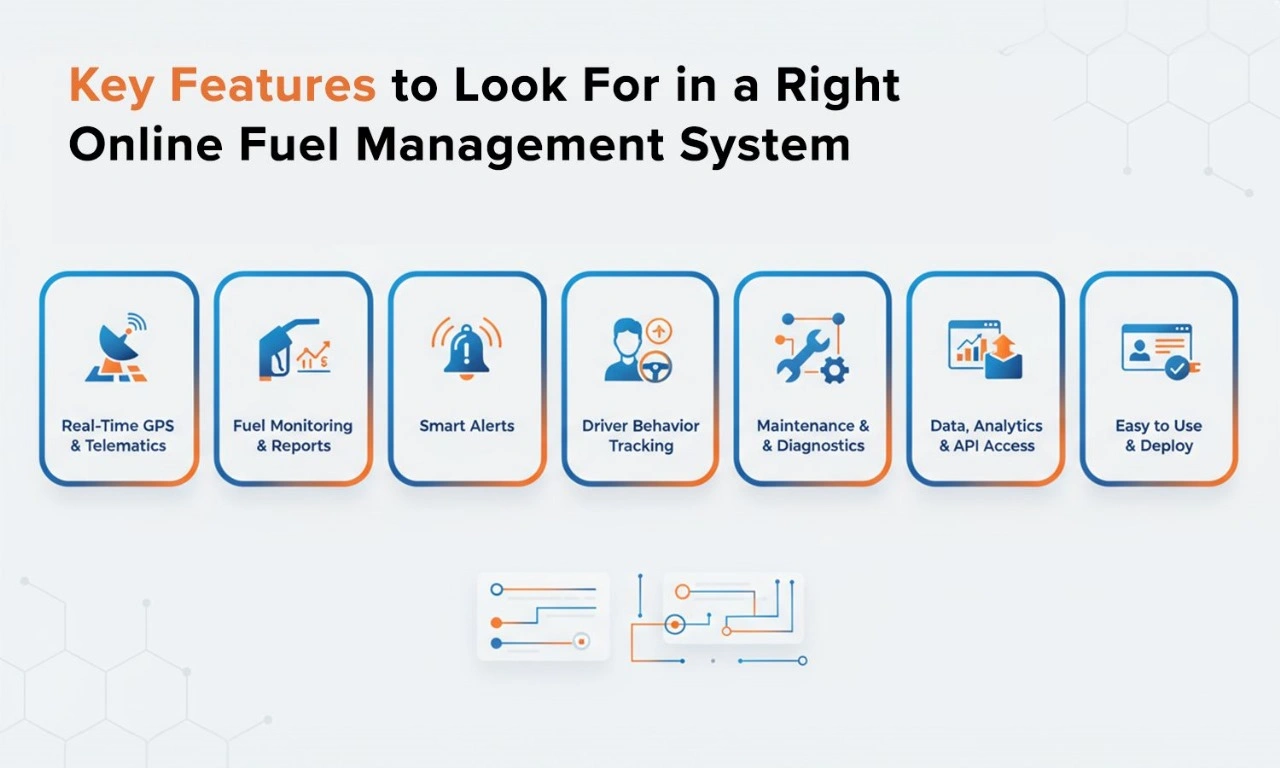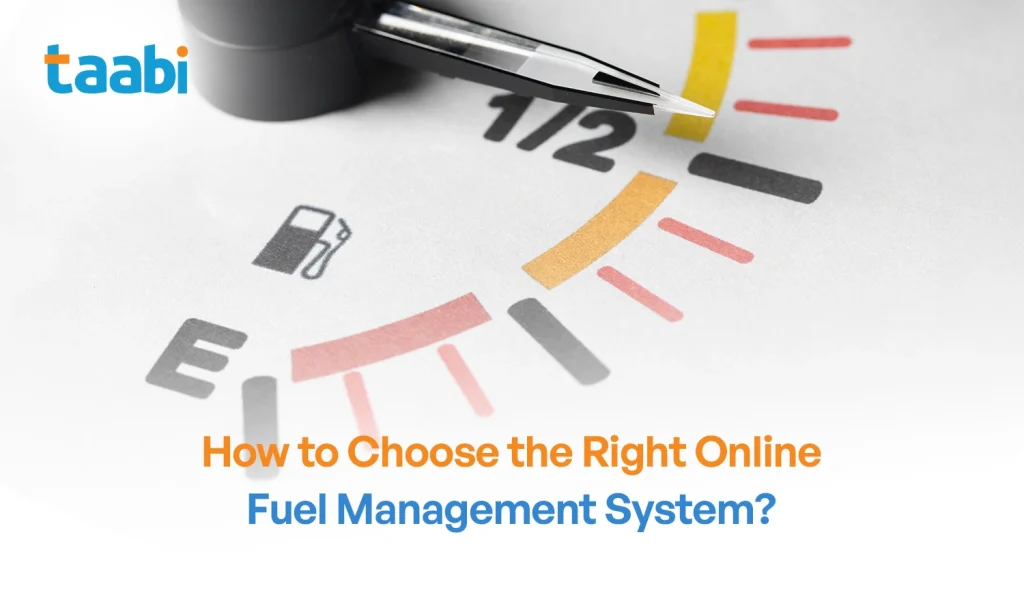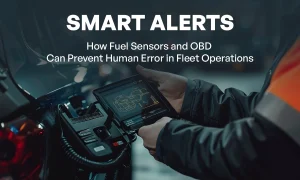Fuel is one of the largest expense lines in any transportation or logistics operation. Selecting the right online fuel management system can help you monitor usage, prevent waste and theft, enhance driver behaviour, and ultimately cut costs. Below is a guide to help you pick the system that best fits your needs.
What is an Online Fuel Management System?
An online fuel management system is a tool (software + hardware) that lets you monitor fuel consumption, track fuel usage in real time across your fleet, often integrated with GPS or telematics, enabling data-driven insights. It can include modules such as fuel gps tracker, fuel monitoring software, vehicle fuel monitoring system, etc.
Key Features to Look For

When comparing options, here are essential features:
1. Real-time GPS tracking + telematics
Ensures you know where each vehicle is, its fuel usage, idling time, routes taken. This helps with route optimization and detecting unusual fuel consumption. Taabi offers fleet telematics with real-time GPS, diagnostics, routing & dispatch.
2. Fuel consumption monitoring system
metrics and reports You want dashboards showing fuel per mile/kilometre, idling fuel loss, fuel usage by driver, by route, etc.
3. Alerts & thresholds
Alerts for when fuel usage spikes, when fuel fill-ups/depletions don’t match expected levels, or any suspected fuel theft.
4. Driver behaviour and safety integration
Speeding, harsh braking, idling all affect fuel economy. Systems that integrate those can help reduce waste.
5. Maintenance & diagnostics
Poor maintenance (dirty air filters, low tyre pressure, engine issues) leads to higher fuel consumption. A system that tracks diagnostics helps keep vehicles fuel-efficient.
6. Data & analytics / open platform
Ability to generate custom reports, integrate with other business systems, see fuel trends, etc. Platforms with open APIs are more flexible.
7. Ease of use and deployment
Hardware installation, software UI, mobile apps, ease of onboarding and training.
Who Needs a Fuel Management System?
➤ Fleet operators with 5+ vehicles: the bigger your fleet, the more potential savings.
➤ Logistics, transportation businesses: especially those running long routes, delivering goods, or moving goods across cities/countries.
➤ Companies concerned about fuel waste, theft or leakage.
➤ Businesses aiming to improve sustainability, lower emissions, reduce idling.
➤ Any business that needs better insight into operating costs and wants accountability from drivers.
Can a online Fuel Management System Reduce Theft?
Yes. With features like GPS‐based logs, fuel fill level sensors, alerts on unusual fuel consumption or fills, and comparison of expected vs actual fuel usage by driver or route, you can uncover theft or misuse. Also, by making data visible and accountable, employee mis-behaviour tends to drop. So an online fuel management system is one of the best tools for reducing fuel theft or misuse.
Which Type of Fuel Is Most Efficient?
While this depends on region and fuel quality, generally:
➤ Diesel tends to offer better miles or kilometres per unit (for heavier vehicles) compared to petrol, especially for long haul.
➤ Alternative fuels (CNG, LNG, electric etc.) may offer efficiency gains depending on infrastructure, cost, availability.
➤ Efficiency is also heavily influenced by vehicle condition, driver behaviour, load factor, route planning etc.
How Much Does A Fuel Management System Cost?
The cost varies widely based on features, fleet size, hardware needed, and whether you opt for basic fuel monitoring software or full telematics with diagnostics and AI. Some components are:
➤ Upfront cost of hardware (fuel sensors, GPS trackers).
➤ Subscription/licensing fees for the software.
➤ Installation costs.
➤ Maintenance, data/connection fees.
For example, providers like Taabi offer modules like fleet telematics, analytics, routing, fuel & energy management and also after-sales services like technical support and proactive maintenance etc. Costs might scale with number of vehicles; for small fleets it might be few dozens to a few hundreds of dollars per vehicle per month; for large fleets, discounts may apply.
How to Decide What’s Right for You
Putting it all together, here’s a process:
1. Define your goals. Do you want to reduce fuel cost, detect theft, improve routes, lower emissions, etc.
2. Assess your current data. How much do you already know about fuel usage? What telemetry or GPS systems do you already have?
3. Set your budget. Include both initial costs and ongoing costs.
4. Evaluate providers. Compare offerings, do they have reliable GPS, driver behaviour tracking, maintenance integration, analytics? How good is their support?
5. Pilot test. Try on a subset of vehicles to see if the system works in your conditions, gives you useful reports, and integrates well.
6. Scale up. Once satisfied, roll it out fleet-wide.
FAQs
How Much Does A Fuel Management System Cost?
It depends on number of vehicles, features, whether you need hardware sensors or already have existing instrumentation. Costs can start modestly for basic fuel monitoring software, and go higher for full vehicle fuel monitoring system with diagnostics and AI. Include subscription fees, installation, maintenance.
Who Needs A Fuel Management System?
Fleet operators, logistics & transportation companies, large delivery firms, businesses concerned about fuel theft or waste, or those aiming to tighten operational efficiency and sustainability.
Can A Fuel Management System Reduce Theft?
Yes. By matching fuel consumption to travelled distance, routes, driver behaviour; triggering alerts for unusual consumption; and through use of fuel gps tracker etc. Transparency tends to reduce opportunity for misuse.
Which Type Of Fuel Is Most Efficient?
Diesel generally offers better efficiency for heavy transport in many markets; alternative fuels like CNG or ethanol blends or electric (where available) can be more efficient or cheaper depending on fuel costs, infrastructure and vehicle technology. But regardless of fuel type, a good online fuel management system helps you extract maximum efficiency.







